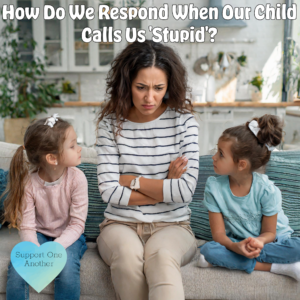
As both a mental health professional and a mother, I understand the challenges that come with managing children’s emotions and navigating respectful behavior within the family dynamic. We are all human, susceptible to frustration, and find it challenging to regulate our own emotions, especially when under pressure from others.
Just the other day, I experienced a situation that underscored these challenges. My 5-year-old child called me “stupid,” a hurtful word that caught me off guard and stirred up a range of emotions within me. In response, my own mother immediately suggested that I hit my child in the mouth as a form of discipline, believing it would deter such disrespectful behavior in the future.
However, as both a mental health professional and a mother, I firmly believe in the importance of modeling the behavior we wish to see in our children. While I was upset by my child’s words, I recognized that reacting with physical punishment would only perpetuate a cycle of disrespect and aggression. Instead, I took a moment to compose myself and explain to my mother that resorting to violence is not an effective or ethical means of correcting behavior.
It’s crucial to recognize that as parents and caregivers, our reactions play a pivotal role in shaping how our children learn to express and manage their emotions. By responding with empathy, patience, and assertive communication, we can model healthy ways of coping with frustration and conflict.
While it’s understandable to feel upset and challenged by disrespectful behavior from our children, it’s essential to respond with compassion and positive discipline strategies. By fostering a nurturing and respectful environment, we can empower our children to navigate their emotions effectively and build healthy relationships based on mutual respect and understanding.
Addressing disrespectful behavior in children requires understanding their developmental stages and tailoring your approach accordingly.
Here’s a breakdown of strategies for different age groups:
Toddlers (1-3 years old): Dealing with disrespectful behavior in toddlers requires a gentle and patient approach. Here are some practical instructions and examples for handling this stage effectively:
- Redirect Attention
Instruction: When you notice your toddler engaging in disrespectful behavior, such as hitting or shouting, calmly intervene and redirect their attention to a more appropriate activity.
Example: If your toddler is hitting a toy out of frustration, gently take their hand and say, “It’s not okay to hit toys. Let’s find something soft to touch instead.” Then guide them towards a plush toy or a sensory activity like playing with kinetic sand.
- Model Respectful Behavior
Instruction: Toddlers learn by imitating those around them, so modeling respectful behavior is essential.
Example: If you accidentally drop something and feel frustrated, demonstrate calmness by saying, “Oops, I dropped it. It’s okay, I’ll pick it up.” This shows your toddler how to handle mistakes without resorting to disrespectful behavior.
- Use Simple Language
Instruction: Keep your explanations brief and simple to ensure toddlers understand why certain behaviors are not acceptable.
Example: If your toddler refuses to share a toy, kneel down to their level and say, “Sharing toys makes our friends happy. Let’s take turns playing with it.”
- Provide Positive Reinforcement
Instruction: Reinforce positive behavior by praising and acknowledging when your toddler acts respectfully.
Example: If your toddler shares a snack with a sibling without being asked, say, “Thank you for sharing! That was very kind of you. Sharing makes us happy.”
- Stay Calm and Patient
Instruction: Respond to disrespectful behavior with patience and a calm demeanor. Toddlers are still learning how to regulate their emotions.
Example: If your toddler throws a tantrum because they can’t have a particular snack, take a deep breath, and say, “I understand you’re upset. Let’s take a break and choose a different snack together.”
- Establish Predictable Routines
Instruction: Toddlers thrive on routine, so establish predictable daily routines to help them feel secure and reduce instances of disrespectful behavior.
Example: Create a routine for meals, playtime, and bedtime, and stick to it as much as possible. Consistency provides toddlers with a sense of stability and reduces frustration.
By implementing these strategies consistently and with patience, you can help toddlers learn to express themselves respectfully and navigate their emotions more effectively. Remember that toddlers are still developing their communication and social skills, so be patient and understanding as they learn and grow.
Preschoolers (3-5 years old): Preschoolers are at a stage where they are beginning to understand social norms and develop empathy. Here are some practical instructions and examples for addressing disrespectful behavior in preschoolers:
- Set Clear Boundaries
Instruction: Establish clear and consistent rules about respectful behavior, and communicate them in a way that preschoolers can understand.
Example: Create a visual chart with pictures or simple words outlining rules like “Use kind words,” “Keep hands to yourself,” and “Listen when others are talking.”
- Use Positive Reinforcement
Instruction: Reinforce positive behavior by praising and rewarding preschoolers when they demonstrate respect towards others.
Example: If a preschooler shares a toy with a friend without being asked, say, “I noticed you shared your toy with Sarah. That was very kind of you! You made her happy.”
- Encourage Empathy
Instruction: Help preschoolers understand how their actions affect others’ feelings by encouraging empathy and perspective-taking.
Example: If a preschooler accidentally knocks over a classmate’s block tower, say, “Look at Sarah’s face. She looks sad because her tower fell. How do you think she feels? What can we do to help her feel better?”
- Teach Conflict Resolution Skills
Instruction: Teach preschoolers how to resolve conflicts peacefully and respectfully by using words to express their feelings and find solutions.
Example: If two preschoolers are arguing over a toy, guide them to use “I” statements like, “I feel upset when you take the toy without asking. Can we take turns playing with it?”
- Provide Choices Within Limits
Instruction: Offer preschoolers choices to promote autonomy while setting limits to ensure their choices are respectful and appropriate.
Example: Instead of demanding that a preschooler clean up their toys immediately, say, “Would you like to put away the blocks or the dolls first?”
- Role-Play Social Situations
Instruction: Practice respectful behavior through role-playing various social situations to help preschoolers understand appropriate responses.
Example: Pretend to be upset when your preschooler accidentally bumps into you and guide them to say, “I’m sorry. Are you okay?” This helps them learn how to apologize and show concern for others.
Consistency and positive reinforcement are key when addressing disrespectful behavior in preschoolers. By providing clear guidance, fostering empathy, and teaching problem-solving skills, you can help them develop respectful attitudes and social skills that will serve them well as they continue to grow and interact with others.
School-Age Children (6-12 years old): Handling disrespectful behavior in school-age children requires a balance of guidance, communication, and consequences. Here are practical instructions and examples for addressing this behavior effectively:
- Communication
Instruction: Foster open communication by creating a safe space for children to express their thoughts and feelings without fear of judgment.
Example: Schedule regular one-on-one chats with your child to discuss their day, any challenges they’re facing, and how they’re feeling about their interactions with others.
- Set Clear Expectations
Instruction: Clearly outline expectations for respectful behavior, both at home and in other settings such as school or extracurricular activities.
Example: Sit down with your child and create a list of behaviors that demonstrate respect, such as using polite language, listening to others without interrupting, and following instructions from adults.
- Teach Problem-Solving Skills
Instruction: Help children develop problem-solving skills to resolve conflicts respectfully and independently.
Example: Role-play different scenarios with your child where they encounter disrespectful behavior from others, and brainstorm together on how they can respond assertively and calmly.
- Use Consequences
Instruction: Implement logical consequences for disrespectful behavior to teach accountability and reinforce positive conduct.
Example: If a child speaks disrespectfully to a family member, they might lose a privilege such as screen time or a favorite toy for a specified period. Explain to them why their behavior was unacceptable and what they can do differently next time.
- Encourage Empathy
Instruction: Foster empathy by helping children understand how their actions impact others’ feelings and experiences.
Example: Prompt your child to consider how their words or actions might have made someone else feel and encourage them to apologize sincerely if they’ve caused harm.
- Model Respectful Behavior
Instruction: Be a positive role model by demonstrating respectful behavior in your own interactions with others.
Example: If you encounter a challenging situation where someone behaves disrespectfully towards you, model assertive but respectful communication in your response. Your child will learn from your example.
- Provide Positive Reinforcement
Instruction: Acknowledge and praise your child when they demonstrate respectful behavior, reinforcing their efforts and encouraging them to continue.
Example: If your child helps a friend who is struggling with a task without being asked, express your appreciation and pride in their kindness and thoughtfulness.
By employing these strategies consistently and with patience, you can help school-age children develop respectful attitudes and behaviors that will serve them well in their interactions with others and contribute positively to their social and emotional development.
Adolescents (13-18 years old): Addressing disrespectful behavior in adolescents requires a delicate balance of guidance, boundaries, and mutual respect. Here are practical instructions and examples for handling this behavior effectively:
- Set Clear Expectations
Instruction: Clearly outline your expectations regarding respectful behavior, both at home and in other settings such as school or with peers.
Example: Sit down with your adolescent and discuss specific behaviors that are unacceptable, such as yelling, swearing, or disrespectful language, and the consequences for violating these expectations.
- Establish Non-Negotiable Limits
Instruction: Set clear and non-negotiable limits regarding disrespectful behavior, emphasizing that certain actions will not be tolerated under any circumstances.
Example: Communicate to your adolescent that disrespectful behavior towards family members, teachers, or peers will result in immediate consequences, such as loss of privileges or increased responsibilities.
- Consistently Enforce Consequences
Instruction: Implement consequences that are meaningful and proportionate to the disrespectful behavior, ensuring consistency in enforcement.
Example: If your adolescent speaks disrespectfully to you or another family member, enforce a consequence such as loss of screen time, restriction from social activities, or additional chores.
- Encourage Open Dialogue
Instruction: Foster open and respectful communication by actively listening to your adolescent’s perspective and concerns without judgment.
Example: Create opportunities for regular check-ins or family meetings where everyone has a chance to share their thoughts and feelings in a respectful manner, allowing adolescents to express themselves without fear of retribution.
- Teach Conflict Resolution Skills
Instruction: Help adolescents develop effective conflict resolution skills, including assertive communication and problem-solving strategies.
Example: Role-play different conflict scenarios with your adolescent and coach them on how to respond calmly and assertively, emphasizing the importance of finding mutually agreeable solutions.
- Model Respectful Behavior
Instruction: Lead by example by consistently demonstrating respectful behavior in your own interactions with others, including your adolescent.
Example: Maintain a calm and respectful tone even in challenging situations, and apologize if you make a mistake or act in a way that goes against your values.
- Reinforce Positive Behavior
Instruction: Acknowledge and praise your adolescent when they demonstrate respectful behavior, reinforcing their efforts and encouraging them to continue.
Example: Compliment your adolescent when they handle a conflict with a peer maturely or show empathy towards someone in need, highlighting the positive impact of their actions.
By implementing these strategies with patience, consistency, and empathy, you can help adolescents understand the importance of respectful behavior and develop the necessary skills to navigate interpersonal relationships effectively. Additionally, maintaining a supportive and nurturing environment will foster trust and mutual respect between you and your adolescent, laying the foundation for healthy communication and positive interactions.
In conclusion, parenting is undoubtedly one of the most rewarding yet challenging journeys we embark on in life. As mental health professionals and parents, we understand the complexities of managing our children’s emotions while navigating our own. We’re all human, and we all have days where frustrations run high and emotions threaten to overwhelm us.
However, it’s during these difficult moments that we have the opportunity to demonstrate resilience and compassion. We can choose to respond to our children’s disrespectful behavior with patience, understanding, and positive discipline strategies, rather than reacting impulsively out of anger or frustration. By doing so, we not only teach our children valuable lessons about empathy and respect but also model the behavior we wish to see in them.
It’s important to remember that none of us are perfect. We will make mistakes, and we will face challenges along the way. But it’s through these experiences that we grow and learn, both as parents and individuals. Every day presents us with an opportunity to reflect, adapt, and strive to be the best parents that we can be.
So, to all the parents out there, take heart in knowing that you are not alone in your struggles. We’re all in this together, learning and growing alongside our children. And while the road may be filled with twists and turns, the journey is ultimately one of love, growth, and endless possibilities. Keep pressing forward, stay patient with yourself and your children, and remember that your efforts today will shape the adults they become tomorrow. You’ve got this!
Feel free to share your thoughts, opinions, and ideas in the comments below. Your insights may resonate with other moms navigating similar experiences, and together, we can continue to support and learn from one another on this beautiful journey of parenthood.
Thank you for being a part of our community, and we look forward to hearing from you!



